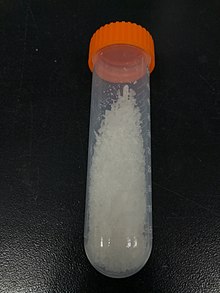Europium(III) nitrate
Appearance

| |
| Names | |
|---|---|
| IUPAC name
Europium trinitrate
| |
| Identifiers | |
| |
3D model (JSmol)
|
|
| ChemSpider | |
| ECHA InfoCard | 100.030.333 |
PubChem CID
|
|
CompTox Dashboard (EPA)
|
|
| Properties | |
| Eu(NO3)3 | |
| Molar mass | 337.985 g/mol 446.081 g/mol (hexahydrate) |
| Melting point | 65[1] °C (149 °F; 338 K) (hexahydrate) decomposes |
| Soluble | |
| Hazards | |
| GHS labelling: | |
 
| |
| Warning | |
| H272, H315, H319, H335 | |
| P210, P220, P221, P261, P264, P271, P280, P302+P352, P304+P340, P305+P351+P338, P312, P321, P332+P313, P337+P313, P362, P370+P378, P403+P233, P405, P501 | |
| Related compounds | |
Other anions
|
Europium(III) phosphate Europium(III) arsenate |
Other cations
|
Samarium(III) nitrate Gadolinium(III) nitrate |
Related compounds
|
Europium(II) nitrate Europium(III) oxide |
Except where otherwise noted, data are given for materials in their standard state (at 25 °C [77 °F], 100 kPa).
| |

Europium(III) nitrate is an inorganic compound with the formula Eu(NO3)3·x(H2O). The hexahydrate is a common salt. It forms colorless hygroscopic crystals.
Preparation
[edit]The salt is usually obtained by dissolving europium(III) oxide (Eu2O3) in nitric acid produces europium(III) nitrate.[2]
- Eu2O3 + 6 HNO3 → 2 Eu(NO3)3 + 3 H2O
Structure
[edit]Like all trinitates of the lanthanides, dilute (<0.01 M) solutions of consists of the aquo complex [Eu(H2O)x]3+ where x = 8 or 9. At higher concentrations, the binding of nitrate to Eu is observed.[3]
Complexes
[edit]Europium(III) nitrate reacts with anions and other Lewis bases to form complexes. For example, with 1,3,5-trimesic acid, europium metal-organic framework, a coordination polymer, under hydrothermal conditions.[4]
References
[edit]- ^ Melnikov, P.; Arkhangelsky, I. V.; Nascimento, V. A.; De Oliveira, L. C. S.; Silva, A. F.; Zanoni, L. Z. (2017). "Thermal properties of europium nitrate hexahydrate Eu(NO3)3·6H2O" (PDF). Journal of Thermal Analysis and Calorimetry. 128 (3): 1353–1358. doi:10.1007/s10973-016-6047-9. S2CID 99674207.
- ^ Odent, Guy; Charetteur, Elisabeth; Duperray, Marie H. Crystallization, radiocrystallographic characterization, and infrared absorption spectra of hexahydrates and pentahydrates of nitrates and lanthanides. Revue de Chimie Minerale, 1975. 12 (1): 17-23.
- ^ Yatsenko, Alexandr V.; Gloriozov, Igor P.; Zhokhova, Nelly I.; Paseshnichenko, Ksenia A.; Aslanov, Leonid A.; Ustynyuk, Yuri A. (2021). "Structure of lanthanide nitrates in solution and in the solid state: DFT modelling of hydration effects". Journal of Molecular Liquids. 323. doi:10.1016/j.molliq.2020.115005.
- ^ Habimana, Fabien; Huo, Yanxia; Jiang, Sai; Ji, Shengfu. Synthesis of europium metal-organic framework (Eu-MOF) and its performance in adsorptive desulfurization. Adsorption, 2016. 22 (8): 1147-1155. DOI:10.1007/s10450-016-9838-1.
